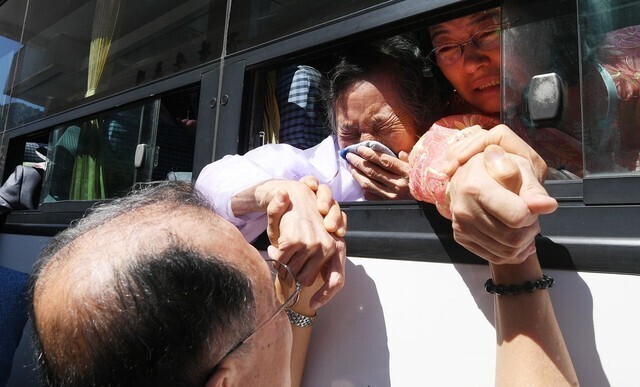hankyoreh
Links to other country sites 다른 나라 사이트 링크
[Column] Biden and Suga's human rights diplomacy should begin with bringing divided families together

I've been researching and reporting inter-Korean relations for more than 20 years, so I've heard many stories on the topic. Until recently, I mistakenly thought I was well-informed about families divided by the Korean War. I'd covered three rounds of reunions for the divided families, and in the course of writing I'd met with various members of divided families in South Korea, including those whose relatives had been abducted by the North Koreans.
Many people, myself included, tend to think of Koreans as being the only ones who were separated by Korea's division into South and North and by the Korean War. But when I read "The Japanese Wives Who Went to Korea," by Japanese documentary photographer Noriko Hayashi, I learned that Koreans aren't the only ones affected by the tragedy of the divided families.
Between 1959 and 1984, 93,340 Zainichi Koreans traveled to North Korea, which encouraged them to return to their ancestral homes. There were also 1,830 "Japanese wives" who departed for North Korea with their Zainichi Korean husbands. I understand there were also a small number of Japanese husbands who accompanied their Zanichi Korean wives on this trip.
Noriko Hayashi went on 11 trips to North Korea between 2013 and 2018 and interviewed nine Japanese wives. Those women's families tried to stop them from marrying Zainichi Koreans and from moving to North Korea with their husbands. Some of these women couldn't even tell their parents that they were leaving Japan.
"I thought I'd return home after three years and that I'd be able to easily travel between Japan and North Korea even after that," one of the wives recalled. But after arriving in North Korea, they had trouble even exchanging letters with family members back in Japan. These women haven't been able to meet their families in Japan for decades — in some cases, as long as 60 years.
In the late 1990s, North Korea set up a program for Japanese wives to visit their homeland, and 43 women took part in three trips. But that program was shut down in 2000 after North Korea-Japan relations broke down over the issue of Japanese abducted by the North Koreans.
These Japanese wives belong to divided families, unable to return home and unsure whether their parents and siblings are alive or dead. That's eerily similar to the sad stories I heard when writing about families divided between South and North Korea. I think these Japanese wives ought to be included in the category of the divided families.
The issue of the divided families is a race against time. Since many members of the divided families in South Korea are advanced in years, it's widely thought that most of them will die in the next 10 years, which would erase the entire issue.
Japanese wives in their 80s and 90s are in a similar situation. The Japanese government and public are indifferent to these women's fate, who long ago followed their husbands to North Korea of their own free will. At this rate, the Japanese wives living in North Korea will also vanish into the abyss of history within a few years.
The Japanese government acts as if the issue of the Japanese abductees is all there is to the North Korean human rights issue. But the divided families are a major humanitarian and human rights issue produced by the division of the peninsula.
Japanese wives say they'd like to visit their homeland at least once before they die. These women are undoubtedly Japanese. Prime Minister Yoshihide Suga is in no position to ignore the issue of the divided families.
There are also divided families in the US. In 2001, it was estimated that Korean Americans included around 100,000 members of divided families, with most of them in their 60s and 70s at the time. Those who are still alive today don't have much time left.
South and North Korea have organized 21 official reunions for the divided families, but North Korea and the US haven't even held a single reunion. For the US, such a reunion would mean reuniting American citizens with their family members in North Korea. That's something the US government should be interested in and try to promote.
If face-to-face reunions aren't feasible during the COVID-19 pandemic, the two sides could start by exchanging letters or video messages so that divided family members can ascertain that their relatives are still alive.
On March 19, the Tom Lantos Human Rights Commission, a bipartisan caucus in the US House of Representatives, emphasized the importance of reunions for members of the divided families in South Korea, North Korea, and the US in an open letter to President Joe Biden. In a column published in a South Korean newspaper in October 2020, while he was still running for office, Biden said he would keep working to arrange reunions for divided families in North Korea and the US.
Reunions of the divided families are less of a liability for South Korea, North Korea, the US, and Japan than other North Korean human rights issues. If North Korean leader Kim Jong-un broadens the issue of the divided families beyond the Korean Peninsula to include Japan and the US, he could gain the support and understanding of the international community.
If Kim Jong-un exercised bold leadership on humanitarian issues such as the reunions of the divided families, it would give North Korea more of a say in what it regards as "fundamental issues." Reunions of the divided families could also serve to reopen dialogue between the US and North Korea, just as it has done in the past in inter-Korean relations.

By Kwon Hyuk-chul, editorial writer
Please direct comments or questions to [english@hani.co.kr]

Editorial・opinion
![[Correspondent’s column] The real reason the US is worried about Chinese ‘overcapacity’ [Correspondent’s column] The real reason the US is worried about Chinese ‘overcapacity’](https://flexible.img.hani.co.kr/flexible/normal/500/300/imgdb/original/2024/0510/5217153290112576.jpg) [Correspondent’s column] The real reason the US is worried about Chinese ‘overcapacity’
[Correspondent’s column] The real reason the US is worried about Chinese ‘overcapacity’![[Editorial] Yoon’s gesture at communication only highlights his reluctance to change [Editorial] Yoon’s gesture at communication only highlights his reluctance to change](https://flexible.img.hani.co.kr/flexible/normal/500/300/imgdb/original/2024/0510/7717153284590168.jpg) [Editorial] Yoon’s gesture at communication only highlights his reluctance to change
[Editorial] Yoon’s gesture at communication only highlights his reluctance to change- [Editorial] Perilous stakes of Trump’s rhetoric around US troop pullout from Korea
- [Guest essay] Preventing Korean Peninsula from becoming front line of new cold war
- [Column] The state is back — but is it in business?
- [Column] Life on our Trisolaris
- [Editorial] Penalties for airing allegations against Korea’s first lady endanger free press
- [Editorial] Yoon must halt procurement of SM-3 interceptor missiles
- [Guest essay] Maybe Korea’s rapid population decline is an opportunity, not a crisis
- [Column] Can Yoon steer diplomacy with Russia, China back on track?
Most viewed articles
- 1[Correspondent’s column] The real reason the US is worried about Chinese ‘overcapacity’
- 2[Editorial] Yoon’s gesture at communication only highlights his reluctance to change
- 3Nuclear South Korea? The hidden implication of hints at US troop withdrawal
- 4[Book review] Who said Asians can’t make some good trouble?
- 5With climate lawsuits, youth around the globe are fighting for their future
- 6Korea poised to overtake Taiwan as world’s No. 2 chip producer by 2032
- 7Yoon voices ‘trust’ in Japanese counterpart, says alliance with US won’t change
- 8Yoon rejects calls for special counsel probes into Marine’s death, first lady in long-awaited presse
- 9Smartphones have been shown to hurt brain development — can Korean kids kick the habit?
- 10[Photo] ‘End the genocide in Gaza’: Students in Korea join global anti-war protest wave